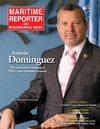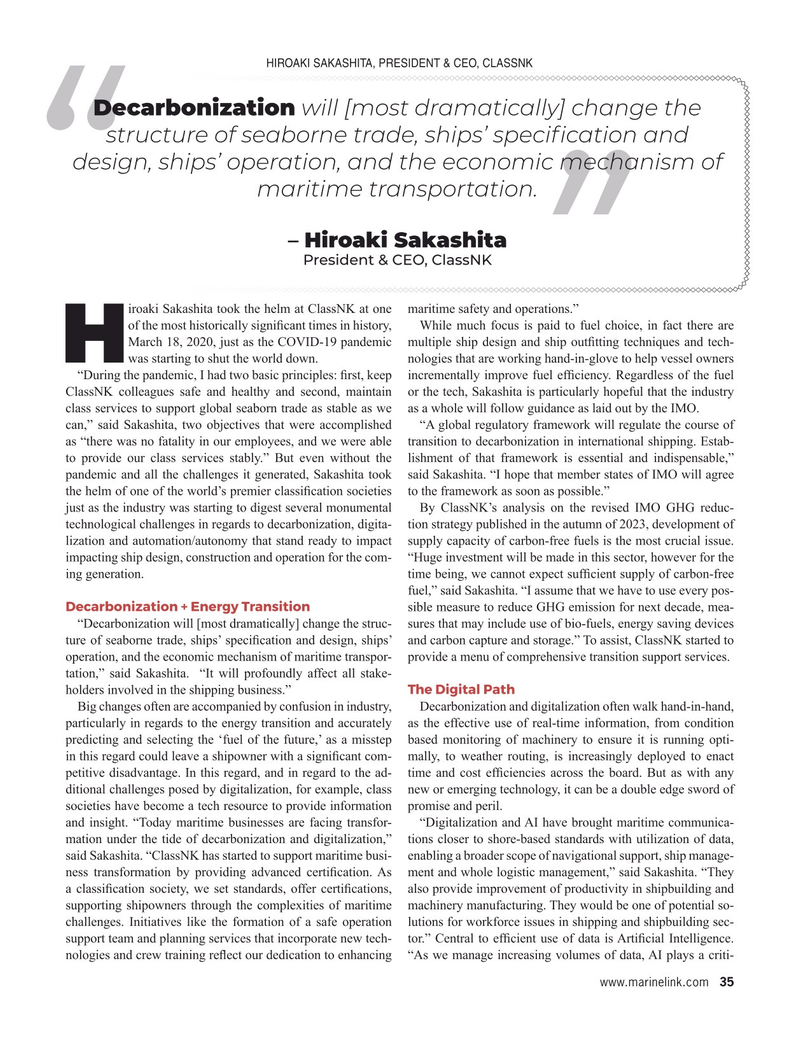
Page 35: of Maritime Reporter Magazine (May 2024)
Read this page in Pdf, Flash or Html5 edition of May 2024 Maritime Reporter Magazine
HIROAKI SAKASHITA, PRESIDENT & CEO, CLASSNK ec ec ec Decarbonization will [most dramatically] change the tr tr tr t structure of seaborne trade, ships’ speci? cation and g g g g g g g design, ships’ operation, and the economic mechanism of maritime transportation.
– Hiroaki Sakashita
President & CEO, ClassNK “ iroaki Sakashita took the helm at ClassNK at one maritime safety and operations.” of the most historically signi? cant times in history, While much focus is paid to fuel choice, in fact there are
March 18, 2020, just as the COVID-19 pandemic multiple ship design and ship out? tting techniques and tech- ”
Hwas starting to shut the world down. nologies that are working hand-in-glove to help vessel owners “During the pandemic, I had two basic principles: ? rst, keep incrementally improve fuel ef? ciency. Regardless of the fuel
ClassNK colleagues safe and healthy and second, maintain or the tech, Sakashita is particularly hopeful that the industry class services to support global seaborn trade as stable as we as a whole will follow guidance as laid out by the IMO.
can,” said Sakashita, two objectives that were accomplished “A global regulatory framework will regulate the course of as “there was no fatality in our employees, and we were able transition to decarbonization in international shipping. Estab- to provide our class services stably.” But even without the lishment of that framework is essential and indispensable,” pandemic and all the challenges it generated, Sakashita took said Sakashita. “I hope that member states of IMO will agree the helm of one of the world’s premier classi? cation societies to the framework as soon as possible.” just as the industry was starting to digest several monumental By ClassNK’s analysis on the revised IMO GHG reduc- technological challenges in regards to decarbonization, digita- tion strategy published in the autumn of 2023, development of lization and automation/autonomy that stand ready to impact supply capacity of carbon-free fuels is the most crucial issue. impacting ship design, construction and operation for the com- “Huge investment will be made in this sector, however for the ing generation. time being, we cannot expect suf? cient supply of carbon-free fuel,” said Sakashita. “I assume that we have to use every pos-
Decarbonization + Energy Transition sible measure to reduce GHG emission for next decade, mea- “Decarbonization will [most dramatically] change the struc- sures that may include use of bio-fuels, energy saving devices ture of seaborne trade, ships’ speci? cation and design, ships’ and carbon capture and storage.” To assist, ClassNK started to operation, and the economic mechanism of maritime transpor- provide a menu of comprehensive transition support services. tation,” said Sakashita. “It will profoundly affect all stake- holders involved in the shipping business.” The Digital Path
Big changes often are accompanied by confusion in industry, Decarbonization and digitalization often walk hand-in-hand, particularly in regards to the energy transition and accurately as the effective use of real-time information, from condition predicting and selecting the ‘fuel of the future,’ as a misstep based monitoring of machinery to ensure it is running opti- in this regard could leave a shipowner with a signi? cant com- mally, to weather routing, is increasingly deployed to enact petitive disadvantage. In this regard, and in regard to the ad- time and cost ef? ciencies across the board. But as with any ditional challenges posed by digitalization, for example, class new or emerging technology, it can be a double edge sword of societies have become a tech resource to provide information promise and peril.
and insight. “Today maritime businesses are facing transfor- “Digitalization and AI have brought maritime communica- mation under the tide of decarbonization and digitalization,” tions closer to shore-based standards with utilization of data, said Sakashita. “ClassNK has started to support maritime busi- enabling a broader scope of navigational support, ship manage- ness transformation by providing advanced certi? cation. As ment and whole logistic management,” said Sakashita. “They a classi? cation society, we set standards, offer certi? cations, also provide improvement of productivity in shipbuilding and supporting shipowners through the complexities of maritime machinery manufacturing. They would be one of potential so- challenges. Initiatives like the formation of a safe operation lutions for workforce issues in shipping and shipbuilding sec- support team and planning services that incorporate new tech- tor.” Central to ef? cient use of data is Arti? cial Intelligence. nologies and crew training re? ect our dedication to enhancing “As we manage increasing volumes of data, AI plays a criti- www.marinelink.com 35
MR #5 (34-49).indd 35 5/3/2024 8:54:00 AM

 34
34

 36
36
